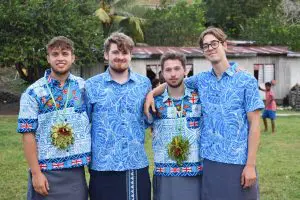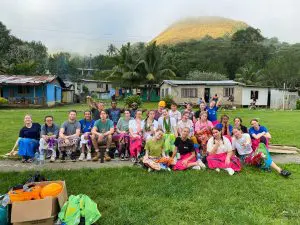
Bournemouth University student, Jai Nutting, shares his story of volunteering with Think Pacific in Fiji this summer. You can read the original post on his blog.
Global Mobility and the Turing Scheme
Launched in 2021, the Turing Scheme has replaced the Erasmus+ programme in providing funding for participants in UK universities, colleges, and schools, to go on international study and work placements.
Bournemouth University successfully applied for Turing Scheme funding for the 21/22 academic year to help their students embark on a unique 4 week global, work-based programme in the Fiji Islands led by Think Pacific, in partnership with the Fijian Government and other local partners.
Throughout the project, participating students expanded their cultural fluency and global citizenship, as well as accessing Think Pacific’s influential partners at an international level.
Jai’s Story
My name is Jai Nutting and this year I will be graduating from the Media Production course at Bournemouth University. My choice to study in Bournemouth was influenced by the reputation of the course, but also the natural scenery in Bournemouth, a nice change from my home town – Leicester.
Over the summer of ‘21, I completed an online internship with Think Pacific creating animated marketing content for Fiji’s national ocean policy, this is how I came across the opportunity to work abroad. When the opportunity came up, a year later, for the university to provide funding for me to go I jumped at the chance.
The theme of self-development and opportunity to connect with people on a similar life path from across the country seemed right up my street.
The funding application for the project was easy to complete and I received plenty of support throughout the process. Without the funding offered by the university this experience wouldn’t have been possible.

When arriving in Fiji, after a long 26 hours of travelling, my initial instinct was to socialise and make an impression on the others participating in the project.
Looking back on this, I wouldn’t have put so much pressure on myself to form connections straight away when I was tired and needed rest. It was great to be away from the UK with a new community, climate, and culture.
The living arrangements in Fiji were very different to back home, with cold showers, shared rooms/bathrooms and arranged food. Initially this was a little overwhelming, but over time, made it easier to bond with the other travellers over our shared familiarities.
The main difference in culture I noticed was their value for community. Fijians have a very welcoming attitude. So much so that it was important to them that I considered their home, my home, urging us to call them “Mum” and “Dad”. The culture is not so focused around money, with many villagers working on the farm to feed the community instead of having jobs.

Unlike in the UK, how people will come in and out of our lives, in Fiji their relationships are much less casual, and family orientated. It is rare for them to meet somebody and never see them again. With this, their vision of success is completely different. They don’t value capitalist success and possessions as much as community and religion.
They even have a concept called “kerekere” which stems from the idea that we are all one and should share our belongings with others. The capitalist culture in the west also comes with a set of principles about asserting your dominance on others, standing tall with your shoulders back. In Fiji, the culture focuses on respect.
If someone is knelt, you should stoop your head and excuse yourself for standing over them. They also value modesty, the men and women will traditionally where a “sulu”, a kilt-like item that hides the legs from the thigh down.
Although their culture was very different to my own, there were some similarities. For example, they have a drinking culture, not unlike that of the UK. However, instead of drinking alcohol, they would drink a fermented root called “kava”.

Whilst working abroad we engaged in various social activities with the Fijians. For example, the national sport in Fiji is rugby, so many evenings would be spent playing rugby with the men and youths of the village.
They also played a lot of music, with natural talent in harmonising and string instruments like the guitar and the ukulele. For me, the most exciting moments of the trip were watching the weekly horse racing events between all the local villages, and going on a river safari speed boat.
The biggest challenges were the lack of variety in food and partaking in long religious devotion. We overcame challenges by forming a strong group dynamic where people would support each other through hard times.

Going to Fiji has increased my cultural knowledge of the media industry. I have learnt more about the importance of the internet to provide information to those without TV, the international reach of social media, the risk of media causing globalisation and diluting cultures.
I have also learnt more about my own culture, the relevance of humour, the small amount of physical touch, and the ability to accept those who are different. This trip has been relevant to my personal development as it gives me a more global perspective to create content in my industry.
I have developed personal confidence through travelling independently and practicing forming connections in a new environment. I have also participated in the construction of a village medical centre and developed my leadership and team working skills. The experience also improved my communication skills, with many of the Fijians only speaking basic English.

It has increased my employability as I have developed resilience and a confidence to overcome adversity. The experience has made me more culturally curious, wanting to travel to more places and experience more things. Going to Fiji has solidified the importance of media in my mind to bring awareness of global issues and help work towards international development.
If I was going to give my past self some advice knowing what I know now it would be to keep an open mind, live in the moment, and try not to think too much about home. I would advise other students to take the opportunity to work abroad, it will open your mind to so many directions and possibilities for your life. I can now confidently say that I helped to construct a medical centre for a Fijian village.
Want to learn more about our projects in Fiji?
Watch the video below or click here to explore our programmes.






